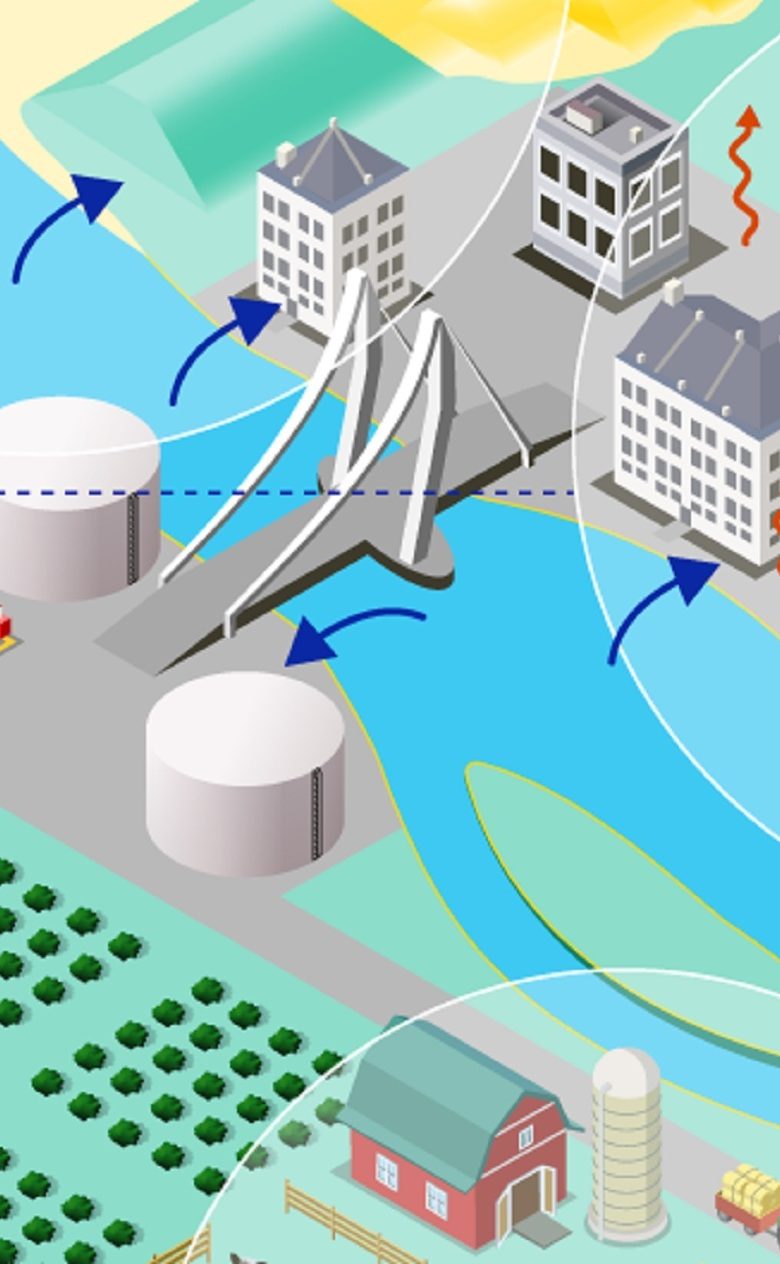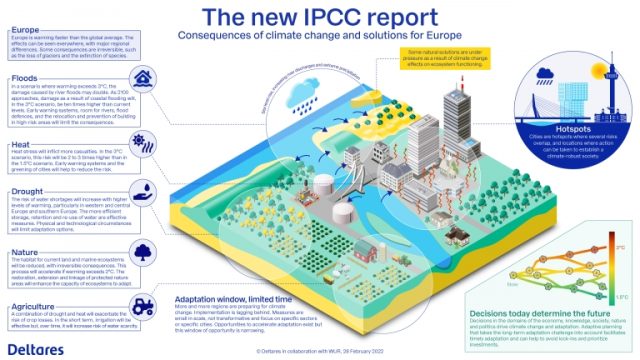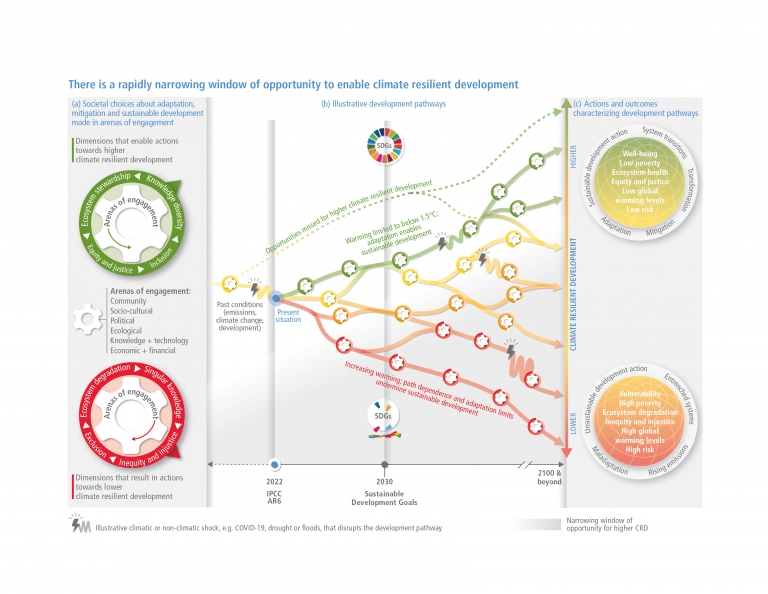New IPCC Report: effects of climate change more serious
We can still take action now in order to live safely and sustainably in deltas and coastal areas in the future. That is the hopeful message of the new IPCC report (WG2). The urgent call is not limited to the need to reduce carbon emissions; it also focuses on accelerating adaptation to the consequences of climate change. Not all effects of climate change can be prevented and so sound preparation is enormously important.

Focus on adaptation
The effects of climate change are already clear to see. The most vulnerable people and ecosystems are being disproportionately affected. The accumulated scientific evidence is indisputable and the IPCC (Intergovernmental Panel on Climate Change) has never stated it so forcefully. The focus of the IPCC Working Group 2 report, which was published today, is on the consequences, risks and adaptation measures of climate change.
Dutch authors
More than 270 scientists worldwide contributed to this report. They included these Dutch lead authors: Marjolijn Haasnoot (Deltares), Robbert Biesbroek (Wageningen University and Research Centre) and Maarten van Aalst (University of Twente). Marjolijn Haasnoot: “This report shows that there are significant risks associated with climate change, and it discusses our adaptation options. An acceleration of adaptation and more drastic measures are needed to keep up with climate change. By taking the long-term adaptation challenge into account, we can make sustainable and timely decisions and prioritize long-term investments.”
Ten lessons for floods, drought, heat, nature and water management
We summarised the ten most important outcomes of the report in the light of our mission: Enabling Delta Life. Which solutions does this report emphasise for floods, drought and heat for people and nature? And what is the significance for coastal and water management?

1. Climate change is already affecting many locations, and those effects will increase with all subsequent warming
Climate change has already led to the significant loss and damage of ecosystems, people's livelihoods and infrastructure. Heat waves, floods and forest fires have become more common due to climate change. Half of the world's population already suffers from water scarcity because of increasing demand for fresh water against a backdrop of declining availability due to increased evaporative loss, changes in snow and glacier dynamics and damage to infrastructure. These trends constitute risks for life in deltas and coastal areas.
2. Tackling the consequences of climate change depends on the interrelated interactions between climate, nature and people
Climate change affects not only people but also ecosystems on land and in the oceans. More than ever, this report emphasises that the loss and damage of ecosystems in every region of the planet pose significant risks, and that these risks are increasing as the planet continues to warm. That impairs the capacity of ecosystems to absorb the effects of climate change and to limit climate change. Both climate and non-climate factors are pushing up the pressure on the water system and require a thorough rethinking of water management and spatial planning.
3. The vulnerability of ecosystems and people to climate change varies between regions but the most vulnerable are most affected
The burden of climate change is not distributed evenly: people who are already in a vulnerable position are disproportionately affected. Climate change therefore contributes to humanitarian crises and conflicts. It has also led to acute food insecurity and malnutrition as a result of floods and droughts in, among other places, Africa and Central America. Vulnerable people in the Netherlands are also more exposed to heat stress, or the financial consequences of storm or flood damage. Building a resilient society requires an awareness of this unequal distribution of climate risks between population groups.
4. Natural ecosystems are under increasing pressure, and so their contribution to mitigation and adaptation efforts is being undermined
Climate change has caused significant (sometimes irreversible) damage to terrestrial, coastal and open-ocean ecosystems. The exploitation of nature, the fragmentation of habitats and damage caused by pollutants are exacerbating the vulnerability of ecosystems to climate change. In addition, some forms of mitigation on land can have adverse ecological effects, such as the widespread introduction of bioenergy crops that can undermine water supplies, food security and biodiversity. We must ensure that the ongoing negative effects of climate change do not harm ecosystem functions.

5. Urban areas are hotspots: the consequences of climate change converge here. However, at the same time, there are opportunities for adaptation and mitigation
With increasing urbanisation, the impact of climate change on human health, critical infrastructure and livelihoods will increase. In particular, the infrastructure for sanitation, water supplies, transport, communications and energy require an upgrade of the design standards in current use. Coastal cities are disproportionately affected by the concentration of economic activities and inhabitants in narrow coastal zones. However, the concentration of construction activity and socio-economic developments offer a wealth of opportunities to implement climate adaptation and mitigation policy.
6. Sea level rise will involve major risks and adaptation challenges for coastal areas
Accelerating sea level rise involves major risks for coastal cities, ecosystems and infrastructure. The threat to livelihoods, health, well-being, food availability, water supplies and cultural heritage is increasing. The severity of the effects of sea level rise will accelerate over the centuries, and those effects could occur much sooner if the sea level rises more rapidly due to the melting of the Antarctic ice sheet. Sea level rise is an existential threat to low-lying deltas, coasts and islands. Adaptation measures consist of protection measures, moving seawards, flexible adaptation and planned withdrawal.
7. Cascading, compound and transboundary effects have a major impact on ecological and humanitarian crises
Multiple climate effects will occur at the same time, resulting in more severe and more widespread impacts. Climate effects can also lead to a cascade of other effects across sectors and regions. Heat can lead to drought, which in turn can lead to forest fires, preventing the retention of water, which in turn can lead to flooding. Climate-related extremes cause economic and social impacts that transcend national boundaries through supply chains, connected river and coastal areas, markets and natural resource flows, with increasing transboundary risks in the water, energy and food sectors. That influences our approach to designing our delta studies.
8. The possibilities for adaptation are unevenly distributed and this gap is widening
Although many countries are preparing for climate change, the plans and the implementation of measures vary widely. The scope and speed of current and planned measures are insufficient to limit the negative effects adequately. Thorough long-term planning and the timely implementation of adaptation policy are necessary to limit the consequences and ensure we do not get stuck or make the wrong investments. This issue was explicitly addressed recently for the Netherlands in the conclusion that water and subsurface processes should serve as a guideline for future land use and water management.
9. Closing the adaptation gap depends on timely action and flexible strategies for the long term
With each increase in the global temperature, new limits to adaptation will emerge in each region. Mitigation and adaptation measures at rates and scales that go beyond current plans are needed to prevent increasing losses and damage. There is more and more evidence that a mix of ecosystem-based (green) and technical (grey) solutions is promising in terms of reducing adaptation costs and contributing to the limitation of flooding and retaining water for periods of drought.
10. Sustainable development and the avoidance of maladaptation require integrated approaches to adaptation, mitigation and addressing societal and environmental challenges
Biodiversity and the resilience of ecosystems to climate change will be impaired if measures are not taken. Actions targeting individual sectors or risks, and prioritising short-term gains, often lead to long-term adverse effects on ecosystems and people. Solutions based on an integrated and inclusive approach can reduce risks and enable climate-resilient development.
Deltares colleagues worked in the past on the report of Working Group 1 on climate change itself. That report was published in August last year [link]. Working Group 3 will publish its report on climate mitigation in April.
The following experts from Deltares contributed to Parts 1 and 2 of the IPCC report:
Roshanka Ranasinghe (coordinating lead author for WG-I)
Bart van den Hurk (lead author for WG-I)
Marjolijn Haasnoot (lead author for WG-II)
Johan Reyns (contributing author for WG-I)
Sadie McEvoy (chapter scientist and contributing author for WG-II)
Gundula Winter (contributing author for WG-II)

